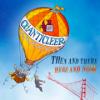In Our American Journey, Chanticleer proves that its virtuosity lies in the choir’s sense of ensemble as much as it does any single voice.
The Grammy-winning all-male vocal ensemble kicked off its 48th Bay Area tour season this Saturday at First Congregational Church in Berkeley. The program revives the choir’s 2002 album of the same name and adds recent commissions to round out its portrait of the U.S. ahead of the nation’s 250th anniversary.
Throughout the performance, Chanticleer was at its strongest when acting as a choir. For the colonial American hymn “Kittery” by William Billings, the ensemble adopted a self-described “twang” of amateur singers and gave the voices a coarse, consonant-laden sound. This was not only a welcome deviation from Chanticleer’s typically pure and round “English” sound, but the bright timbre was a perfect vehicle to demonstrate the group’s fine sensitivity to intonation, giving off a luminous tone.
This same unity of sound was present in the African American spiritual “There Is a Balm in Gilead,” arranged for Chanticleer by Joseph H. Jennings (the group’s music director emeritus.) Here however, rather than a bright ringing, the choir hummed smooth harmonies beneath a soloist carrying the tune. Jennings’ arrangement imbued the simplest harmonies with heartfelt sincerity, moments of complexity, and a pointed directness that the choir delivered beautifully.
Of note for this performance was the premiere of a new piece, Happy Shore, by composer Trevor Weston. Setting a text by Richard Allen (the founder of the African Methodist Episcopal church), Weston crafted an original 19th-century style hymn in a fitting nod to the concert’s curation. The initial melody alone is one any hymnodist of the time would have been proud to have written, and Chanticleer was particularly skilled at singing it. While the choir seemed less in their element as Weston reshaped and drove the hymn into African American congregational singing practices, the core idea of the work was never lost. The thick harmonies at the end were delivered with a blend and balance that tied the whole performance together.
If there was a weak point to the concert, it was in the choir’s handling of smaller, more intimate moments. Early in the evening, it reduced to a chamber choir for the motet Lamentatio in Coena Domini by 17th-century colonial Mexican composer Juan de Lienas. The performance revealed a faltering, less confident sound than the ensemble’s refined tutti singing would lead one to expect. In general, many of the vocal solos on the program did not reach the same caliber of controlled expression as the full ensemble sections. One notable exception was tenor Vineel Garisa Mahal’s florid solo in his arrangement of Brahmamokate (The oneness of existence).
This iteration of Our American Journey will be most appreciated by lovers of contemporary choral music. The dynamic energy of sound leaping across the choir in Chen Yi’s I Hear the Siren’s Call perfectly exhibited its masterful ensemble work that made the whole program engaging. The lush yet transparent performance of Brent Michael Davids’ The Un-Covered Wagon was equally a high point.
Of course, standards of the American choral repertoire are present with Virgil Thomson’s My Shepherd Will Supply My Need and Randall Thompson’s Alleluia. While both renditions were perfectly pleasant, they lacked the sense of import and intentional interpretation that both need in order to come off the page.
The final piece on the program, an arrangement of the song “Home” from the musical The Wiz, arranged by bass-baritone Jared Graveley, seemed to knowingly play into the hand of his colleagues’ strong suits and the ensemble’s capabilities. The spirited performance led into a well-earned encore of the folksong “Shenandoah” — a fitting and ethereal denouement for Our American Journey.




